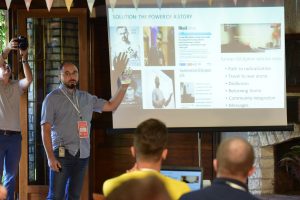Afrodita Musliu watched the first military planes enter Syria from her spot on a Turkish beach in 2013. But it was not long before the effects of the war came to her hometown of Skopje, Macedonia. Young ethnic Albanian men and some women began leaving their homes and heading for the battlefields in Syria and Iraq.
“I hadn’t seen this issue, my organization was mostly working on projects with youth and minorities,” she says. “But I am a mother of three and I thought ‘we have to do something.’ The government was not doing anything to prevent people from going; this was not an issue that was being openly discussed in Macedonia at that time.” In fact, Macedonia had one of the highest proportions of members of its Muslim community departing for foreign battlefields. (Bosnia and Kosovo had higher numbers, but Macedonia’s ethnic Albanian Muslim community is approximately one quarter of the country’s population, so taken as a proportion of Macedonia’s Muslims, the number was proportionally higher.)
With the aphorism “Think global, act local,” in the back of her mind, Musliu established Nexus Civil Concept to focus on preventing violent extremism through youth empowerment and inter-ethnic tolerance. She realized that the best way to understand the push and pull factors driving emigration would be to try to find someone who had left for the battlefield but had returned, and to speak not only with them but with their closest family members.
In September 2014, Macedonia adopted a law criminalizing travel to foreign battlefields. But Musliu was able to find some citizens who had travelled abroad to fight but had returned to the country before the law was passed, meaning they were free from prosecution and willing to speak, albeit with some measures protecting their identities.
“They were a typical traditional Albanian family from Skopje,” she says of the man who was featured in the Nexus Civil Concept video “The truth of the promised caliphate”. He told Musliu that because he was unemployed, he was online all the time watching powerful propaganda videos on YouTube about how Bashar Al Assad’s forces were bombing and killing children, which motivated him to act.
But, he soon came back because “he was disappointed, expecting something else. He was young and he was manipulated.”
Musliu says that she wants to fight back against such online propaganda, which are prevalent in the online space in her country, to ensure that others do not fall prey to these messages, risking their lives. Musliu has shown her video to focus groups and sought feedback online. Almost half of the respondents had not seen a similar video, and almost 90 percent said that they wanted to see more videos like this, indicating a need for Musliu’s organization to continue their work in educating about this phenomenon and bringing it into the public discourse.

“Only now in Macedonia are we starting to talk about this phenomenon,” she says.
But now the government has started to tackle the issue of radicalization head on. Musliu’s organization will be part of the government’s first project working on the front line in preventing violent extremism, with school workers as part of a joint initiative of the Macedonian Ministries of Education and Interior, along with the Islamic Community, and the local governments from Kumanovo, Cair, Tetovo, and Gostivar.
NEXUS Civil Concept is also working with the national coordinator for PVE.
“The most important thing is mutual trust,” she says, adding that Islamic extremism is not the only concern in Macedonia.
Macedonia is diverse but also divided, and the country narrowly avoided war in 2001 after ethnic Albanian separatists demanded further minority protections. In 2018, issues of ethnic identity, language and governance structure are again dominating politics and it is important that someone is monitoring the types of messages people are getting online.
“Nationalistic extremism could be a very big issue in the Balkans and in Macedonia it is a big deal,” she says. The internet is full of nationalistic content, posing a risk for young people especially, which can serve to both radicalize people towards nationalist views, or make members of specific communities feel targeted. “Four years ago, there were 25,000 video clips containing xenophobic or nationalistic content uploaded online from Macedonia. In terms of articles there were 41 million words containing offensive and rude expressions in cyrillic, and 106 million words in the latin script,” she says, alluding to both of the alphabets used in Macedonia.
“It is simply too much!”
The Story2Tell project by Nexus Civil Concept received seed funding and mentoring support from the Resonant Voices Initiative
